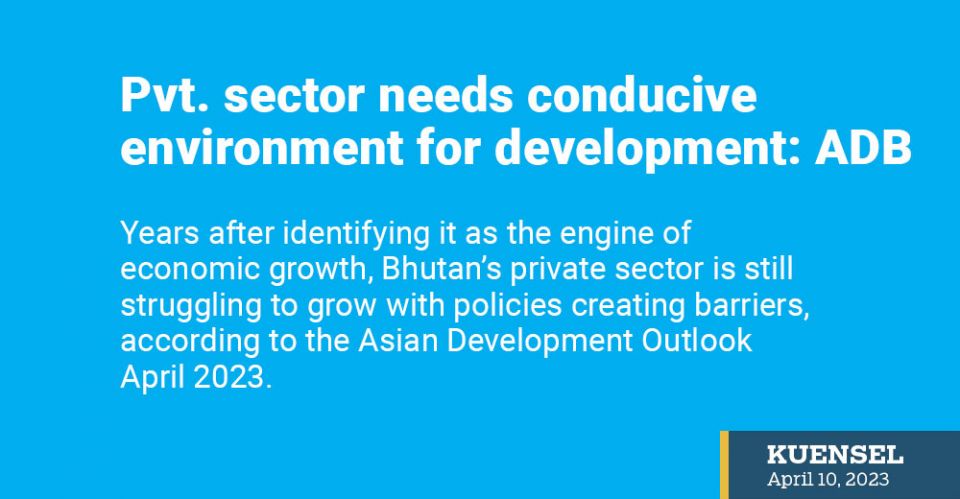
Years after identifying it as the engine of economic growth, Bhutan’s private sector is still struggling to grow with policies creating barriers, according to the Asian Development Outlook April 2023.
The outlook calls for strengthening the private sector as a partner in economic development.
Economics Officer of ADB, Sonam Lhendup said, “The private sector needs to grow to achieve the government’s ambitious target of a USD 10B economy by 2034. This will require additional reforms.”
According to the ADB’s outlook, aside from hydropower, the economy is largely stagnant because of policy challenges for private sector development. “This is an obstacle to equitable growth because hydropower and related sectors use little labour,” the outlook stated.
Sonam Lhendup said that the private sector is constrained by a regulatory burden and factor market constraints.
He said that Bhutan’s business environment is held back by burdensome business compliance processes, a shortage of skilled workers, low digitization, crowding out by state-owned enterprises, and poor access to finance.
He also said that it is imperative to create an environment of policy certainty, promote the private sector through public–private partnerships (PPPs), privatise loss-making state-owned enterprises (SOEs), and support skill development, product innovation, and process innovation.
“Foreign Direct Investment (FDI) will be essential, given the large and growing gap between savings and investment,” he said.
As competition for such inflows is highly competitive, a favourable policy framework is identified as an essential requirement to induce entry, smoothen the operations of foreign companies, and improve access to credit.
The Country Director of Bhutan Resident Mission, ADB, Shamit Chakravant, said that the FDI is one component that creates employment opportunities in the country. However, it has failed to attract FDIs over the years.
“The government should create a conducive environment like waiving sustainable development fees for those investors who are willing to invest in the country for their initial visit,” the Country Director said.
According to the ADB, the average FDI inflows to Bhutan have been less than USD 20M a year since 2010, contributing less than 1 percent of the gross domestic product.
Bhutan is the least attractive country for FDI in Asian countries.
ADB mentioned that an environment of trust and policy certainty needs to be established. The urgency of private sector development is greater than ever given the ongoing mass emigration.
Thousands of Bhutanese have emigrated for economic reasons in the past year. Unless the private sector is empowered to create jobs that match the aspirations of Bhutanese youth, the exodus of human capital will continue, hampering the country’s long-term development efforts.
While the public sector and agriculture collectively provide about 63 percent of employment and a quarter of the Gross Domestic Product (GDP), construction, electricity, water, and gas provide another quarter of GDP with only 8 percent of employment.
Meanwhile, the GDP share of manufacturing has slowly fallen since 2009 while its employment share held steady, indicating a lack of productivity growth.
The official from ADB said that the absence of a dynamic private sector constrains the creation of productive employment for Bhutanese, which is reflected in rising youth unemployment over the past three years to a high rate of 29 percent in 2022.
ADB pointed out and recommended that Bhutan needs to create a conducive business environment for the private sector by creating an environment of policy certainty and the government needs to simplify licensing policies or reduce the number of clearances or cut business registration costs to increase formality.
ADB also recommended promoting the private sector through PPP by simplifying rules for PPPs to allow unsolicited proposals and differentiate projects based on risk profile to fast-track the approval process.
ADB pointed out to reduce overlap between SOEs in areas where the private sector can operate, review and rationalize the role of SOEs and promote digitalization, easier access to finance, and foster entrepreneurship.
The officials from ADB said that some of the SOEs overlap the functions and mandates of other SOEs.












